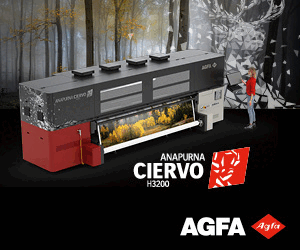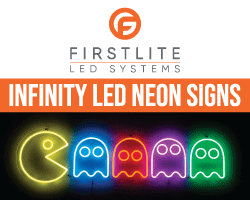The retail industry is an increasingly competitive space as businesses and brands consistently battle to beat rivals on prices, match promotions, offer customers better deals, and grab the most attention in-store. This means suppliers to the retail industry cannot afford not to deliver outstanding quality, meet tight deadlines, and accommodate ambitious projects. As one of the leading producers of POS to the retail industry as well as the largest producer of OOH print, collaborating with customers including B&Q, Waitrose, H&M, M&S, and Tesco, SMP Group in London knows these demands all too well.
Peter Darwin, Operations Director at SMP Group, says: “We’re constantly challenged by our clients to provide higher quality, quicker turnaround, cheaper prices in reality, and we need to be initiative-taking in finding ways to get that out to the market.”


To uphold their competitive advantage, SMP needs durable, dependable digital equipment on the shop floor, and as their existing flatbed inkjet presses approached end of life and digital work including plastics, polypropylene, and corrugated boards continued to grow at a significant rate, the business was on the lookout for a new solution. “We sweat our equipment, and that’s fundamental to the way the business runs,” explains Darwin. “We need to be able to work our equipment hard as it’s part and parcel of why we buy it; we don’t want equipment that’s going to come in and two years later be either redundant or broken.”
SMP are not a business that dives in headfirst without thoroughly weighing up a decision, particularly one as crucial as a significant investment in a new press, so when the company heard about Inca’s developments in producing a new and improved piece of equipment, the proven quality of the new kit’s base architecture and Inca’s reputation as a great business to work with gave SMP the confidence it needed to dip a toe in the water.
That confidence encouraged SMP to take on an Onset on a beta basis, marking the start of SMP and Inca’s enduring relationship. “The first Inca beta we had proved itself very quickly, despite being a beta model,” explains Darwin. “We hit the ground running without any issues, and when we started to look for another machine, clearly Inca were always going to be a frontrunner.”
Explaining how SMP took on the first Inca Onset HS, Darwin continues: “We were in discussions about buying another version of what we had, but it was Inca that explained what they were doing with the HS models. That is a notable example of the strong working relationship we have. To be honest, there was not a big decision to make. As soon as we were offered a version that was faster, with the same high quality, we thought, what’s not to like?”

Darwin admits his initial scepticism about the robot solution, having not had the feature on SMP’s first Onset X3. Inca’s consultancy around the feature and SMP’s ultimate success with the robot is another testament to the trust between both parties. “It took a bit of convincing,” says Darwin, “but it proved to be the right thing to do. Some of the team on the shop floor were also unsure initially, but it has made them more comfortable and freed them up from lifting heavy materials day in and day out, which has turned out to be an important benefit.”
When asked to sum up in a few words what difference the Inca Onset technology has made to SMP’s business, Darwin encapsulates it with a simple sentiment that will no doubt resonate with many print businesses: “It took a lot of the pain away.” He continues: “We know the machine is going to run smoothly, we know the quality it produces is the high quality that our clients expect. The speed is consistent, and we know that if we were to have a problem it would be addressed, right away. So yes, I think it has cured the pain.”
SMP is a business continuing to grow, always looking to add new clients to the roster and at the stage where they are sought-after by customers (‘a much nicer place to be,’ says Darwin). As they look to free up more space for digital, it is crucial that this consistency and rhythm continues, and that is why the relationship between the two companies is a vital component.
Matt Brooks, Products and Solutions Director, Inca, says: “Inca wants to very much be a part of SMP’s journey and plans. Through our close working relationship, we feel we understand the needs and demands of the business, and we have a core group of people who work on meeting those needs through the development of our product range and support of our customers day to day, month to month, year to year. That is key to the sort of the relationship we have with SMP because we view them as a genuine partner as opposed to just another transactional order.”
What has been built through reliability, trust, and transparency, is a mutually beneficial relationship where opinions, ideas, and feedback are as advantageous as the technology itself. “It works for us because we are incredibly open with Inca, being open to their thoughts and ideas and allowing them to be privy to a lot of what we are doing when they are here. We don’t hide anything, we discuss our challenges, and that is the openness of the relationship. We might approach Inca and ask, what can we do about this? Inca may want to change something and ask us; do you want to try it?”
Matt Brooks continues: “It is trust primarily that allows a beta installation to happen. The team at SMP see the model in the test centre before and then the relationship side comes into play, during a beta phase there is an ongoing exchange of dialogue and a number of visits, so openness and trust is important. SMP is a business that wants to be ahead of the competition and is not afraid to give us constructive feedback, the good and the bad, to help us improve, and they are always open to our consultation and guidance. For example, we have a new version of our user interface on both presses, and I feel comfortable that I could call Pete [Darwin] or other members of the team and say, we feel this would be a benefit. That has all come from previous betas, we have built that level of openness and trust.”
Darwin agrees that openness to trying new things and trust in Inca as a business is an ideal fit for SMP’s model; they are always going to be an operation that works its equipment hard and doesn’t enter into new machine investments on a whim, but they will also be open to discussing upgrades and new developments, and can trust Inca’s counsel on how those developments can help SMP achieve its goals. “We do not rush into decisions, but if there are developments on the horizon, we would like to be part of those conversations. We are always looking to invest in our future.”















